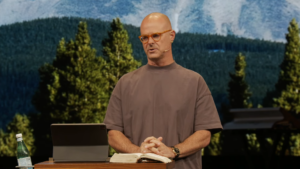The Daniel Keene case shows how extra-biblical “charges,” opaque processes, and elder overreach corrode Baptist polity.
Historic Baptist church discipline is meant to protect the purity of the church and restore sinners through clear, biblical charges and a congregational process (Matt. 18:15–17; 1 Cor. 5). What happened to Texas business owner Daniel Keene, as told in his interview with Jon Harris on Conversations That Matter and in prior reporting at the Blaze (see here and here), is the opposite: an informal, elder-driven proceeding that imported secular taboos (“racism” as defined by progressive sensibilities) as if they were biblical categories, leveraged tone-policing rather than chapter-and-verse, and culminated in pressuring a member to leave—without a transparent charge, without the congregation, and without pastoral care for his family in crisis. That’s not discipline. That’s spiritual abuse dressed in ecclesial clothing.
“This is church discipline,” an elder reportedly told Keene when he asked whether he was on the path to removal—despite no clear, written charge from Scripture and even after he deleted the post in question.
What the interview establishes (in brief)
- The spark. Keene posted a short video from his neighborhood showing a public Hindu celebration and wrote, “We have to end H-1B visas now. I want my kids to grow up in America, not India.” The post went viral; online retaliation followed (bad-review brigades, threats).
- The church’s move. Within 24–48 hours, elders launched a two-call + in-person meeting sequence, asserting that Keene’s “tone” and “not loving neighbor” amounted to sin, summarized to him as “racism.” They repeatedly declined to give him a specific written charge from Scripture despite requests.
- Discipline—without the Bible or the body. Keene was immediately removed from lay roles. He was told this was church discipline and, if he “continued,” it could move toward barring from the Table. Eventually, elders asked him to find another church.
- Process irregularities. No Matthew 18 chain with identifiable personal sin; no 1 Cor. 5-style congregational action; shifting, extra-biblical standards; a premium on optics; and pressure extended to Keene’s pregnant wife to attend a late-stage meeting.
(All facts above drawn from Keene’s public interview; if the elders later produced written statements, they were not presented to the congregation for adjudication per Matthew 18’s final step.)
Biblical church discipline: what it is—and isn’t
Biblical discipline is:
- Text-anchored: clearly stated sins from Scripture, not social-taboo categories (Matt. 18:15; 2 Tim. 3:16–17).
- Personal and proportionate: private reproof, then two or three witnesses, then the church (Matt. 18:15–17).
- Congregational: the church renders the final judgment, not a closed session of elders (Matt. 18:17; 1 Cor. 5:4–5).
- Aimed at restoration: discipline is medicinal, not managerial (Gal. 6:1).
It is not:
- Tone-policing of lawful speech outside the church, especially on prudential public-policy matters where Christians may disagree (Rom. 14).
- Expanding the sin list to include undefined “ism’s” policed by the zeitgeist, while refusing to name concrete biblical violations.
- Elder-rule shortcuts that bypass the congregation and convert disagreement into “insubordination.”
How Baptist polity gets inverted
Baptists confess congregational authority under Christ’s Word. Elders teach, lead, and recommend; the church binds and looses (Matt. 18; 1 Cor. 5; historic Baptist confessions). In practice, however, many “elder-led” churches function as elder-ruled: the board quietly initiates, prosecutes, and concludes discipline—then “informs” the congregation (if they absolutely have to) after the fact. That drift produces four predictable abuses, all present in Keene’s account:
- Extra-biblical charges. “Racism,” as deployed here, operated as a catch-all for not affirming multicultural pluralism. Elders admitted Keene could hold his policy view; they punished the way he expressed it. That’s not a biblical category; it’s a subjective vibe check.
- Process opacity. Refusing to provide a written, text-based charge while accelerating meetings is institutional bullying, not shepherding.
- Punishment first, proof later. Immediate removal from responsibilities before establishing sin or obtaining congregational judgment flips the order of justice.
- Optics over souls. The priority seemed to be protecting the church’s brand in a viral moment, not protecting a frightened family under online attack—nor discipling the member through principled disagreement.
“Not loving your neighbor”: a misapplied maxim
Christ’s command to love our neighbors (Matt. 22:39) is not a blank check for civilizational relativism. It does not require Christians to (a) celebrate public idolatry, (b) pretend mass immigration has no social costs, or (c) surrender the liberty to argue hard public-policy lines in lawful ways (Rom. 13; Prov. 14:34). Prophets regularly condemned public idolatry; apostles called believers to abhor what is evil (Rom. 12:9). Calling public pagan worship “evil” is moral clarity, not malice.
If a pastor believes a member’s rhetoric truly crossed a biblical line (slander, reviling, partiality, threats), he must show the verse, name the act, and pastor toward repentance—not outsource moral judgment to the world’s categories.
The “pulpit/pew” wall that enables abuse
One reason these cases keep surfacing: a false divide between “spiritual” pulpit issues and “political” pew issues (discussed at length here). Elders declare public questions off-limits—until a member says something unpopular online. Then the iron wall turns into a trapdoor: now it’s spiritual, now we discipline. This is incoherent. Pastors in America are self-governing citizens (Rom. 13; 1 Pet. 2) who should model principled engagement with public questions. If the pulpit won’t teach Christians how to apply Scripture in the public square, it forfeits the moral ground to punish laymen for trying.
Red flags that your church’s discipline is going off the rails
- No written, Scripture-anchored charge after you ask for one.
- “Tone” or “optics” language replacing biblical categories.
- Immediate removal from service with no established sin.
- Meetings stacked with elders, but no invitation to bring witnesses.
- Bylaws used to avoid congregational involvement (or “membership updates” used as post-hoc ratification).
- Pressure on your spouse to attend “for optics,” not care.
If you’re seeing these, document everything, insist on Scripture, and—if necessary—appeal to the congregation. If that avenue is closed, you’re not in a congregational church; you’re in an elder-ruled corporation with Sunday music.
A better, Baptist way forward (concrete reforms)
- Codify due process. Require written charges citing specific texts, delivered to the member before any action.
- Restore congregational authority. Any removal from membership must be a church action, not an elder memo.
- Define discipline’s scope. Limit to biblically defined sins that are personal, provable, and unrepented—not prudential policy disputes.
- Protect families. Bar meetings that pressure spouses late in pregnancy; assign pastoral care when online mobs form.
- Teach Christian citizenship. Preach how to apply the Decalogue and the whole counsel of God to public life, so laymen aren’t punished for doing what pulpits neglect.
- Transparency after action. If discipline proceeds, read the charge and Scripture to the body, state the unrepentant behavior, and call for prayer and pursuit—no PR euphemisms.
Why this matters beyond one church
This issue is particularly troubling considering how much respect Matt Boswell has in conservative circles. Yet Keene’s story is not an outlier. It’s a case study in how seeker-sensitive respectability and elder-centric governance combine to create a new set of “sins” (offending elite tastes) while ignoring the old ones (cowardice, partiality, fear of man). When discipline is decoupled from Scripture and the congregation, it becomes a cudgel to manage optics and marginalize dissent. That’s not Baptist. It’s not biblical. And it will keep hemorrhaging faithful men and families until churches repent—of abusing discipline itself.
See Jon Harris’s interview with Daniel Keene here:
























One response to “Church Discipline or Spiritual Abuse?”
Mathew 18 says “if your brother sins against you…” framing the context for the steps that follow. Where does the passage say, “For any and every perceived sin—public, private, involving multiple persons or not—follow these steps”?
Did Paul follow these steps in Gal 2 or Titus 3? No. You’re being extrabiblical here.